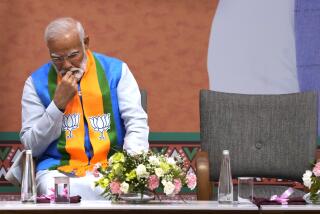India’s Stock Market Jittery as Gandhi Is Poised to Take Power
- Share via
NEW DELHI — Sonia Gandhi is set to become India’s prime minister after securing the support of left-wing allies Friday, as the nation’s stock market experienced its worst fall in four years.
Gandhi, the Italian-born wife of late Prime Minister Rajiv Gandhi, could clinch the nation’s top post in a vote of her Congress Party this weekend. Her rise would restore to power a dynasty that has largely dominated Indian politics since independence from Britain in 1947.
In a surprise upset, Prime Minister Atal Behari Vajpayee’s ruling party was defeated in elections Thursday. Gandhi’s party fell short of a majority in Parliament and needs the support from left-wing groups, which are led by the Communist Party of India (Marxist), to form a government.
On Friday, as negotiations with potential coalition partners continued, Congress Party officials reported that Gandhi had enough broad support to become prime minister if she was confirmed as the party’s leader in Parliament this weekend.
The Communists insist they are friendly to capitalists, including foreign investors, who meet certain requirements, such as protecting jobs and transferring technology to India. However, fears that the leftists will force Gandhi to slow -- or even roll back -- economic reforms pushed through during Vajpayee’s seven-year rule brought stocks down sharply Friday.
The Bombay Stock Exchange’s benchmark index, the Sensex, dropped 6.1%. The index is down 7.5% since the voting began April 20.
Banks and state-owned companies suffered some of the heaviest losses amid signals that the new government would block the sale of the most attractive state-run companies, such as telecommunications and oil firms.
The Congress Party’s Manmohan Singh, who first opened up India’s economy as finance minister in the early 1990s, said the incoming government would continue with economic reforms. But it will sell only some state-owned companies, and state oil firms will not be among them, he added.
Pranab Mukherjee, Gandhi’s point man on negotiations with the Communists, told The Times that the government should hold on to any state-owned enterprise that turns a profit.
“I would say that privatization and similar reforms are not the cardinal points of economic reforms,” said Mukherjee, also a former finance minister. “What is most important is to unleash the potential of growth in various sectors. If an undertaking is earning profit in a competitive manner, there is no reason why it should be disinvested.”
India’s most profitable state-owned enterprises are among the most attractive to buyers, which is why they suffered some of the heaviest losses on the Bombay stock exchange Friday. The main index of state-run companies plunged 14%; bank shares fell more than 10%.
Last year, India’s most profitable state companies included telecom giants BSNL and MTNL, oil firms such as ONGC and Indian Oil, and power companies such as Nuclear Power Corp. The worst money-losers included Steel Authority of India and Fertilizer Corp.
The Communists insist that state-owned firms operating in the red should be sold only as a last resort, if technology upgrades or other measures can’t save them. Harkishen Singh Surjeet , the party general secretary, told reporters Friday that India didn’t need the ministry that oversees the sale of state-owned companies anymore.
Other supporters of the incoming government called for an increase in subsidies to ease the rising costs of fuel.
Congress Party officials indicated that Gandhi wasn’t likely to meet either demand. She is already feeling the squeeze of competing demands, from India’s left for more state intervention in the economy and from international market forces to give private capital a bigger role.
About 70% of India’s 1 billion people are village farmers. Gandhi’s claims that the nation’s surging economy was leaving the poorest behind struck a chord in the countryside, where 350 million people are desperately poor.
She promised a new approach to economic reforms that would help farmers by providing more irrigation projects and more money for education and healthcare, and would move more cautiously in efforts to dismantle the remnants of central economic control.
Mukherjee is a newly elected Congress Party member of Parliament from West Bengal state, where voters have kept Communist governments in power for decades. His name is often floated as a compromise prime minister if Gandhi does not seek the post or later steps down.
Although her party and the Communists are vowing to be allies in the federal government, they are bitter rivals in states such as West Bengal and Kerala, where left-wing parties have long been powerful. As the election campaign ended, Gandhi angered Communist leaders there by accusing left-wing parties of ruining West Bengal state’s economy over the last 27 years.
The Communists plan to announce their minimum demands for supporting Gandhi’s government after a meeting of the party’s politburo and central committee over the weekend. But the record of Communist and Congress Party governments in several of India’s states offers hints of what the incoming federal government may do.
When the Congress Party came to power in a landslide in the state of Andhra Pradesh on Wednesday, the incoming chief minister announced he would provide free electricity to millions of farmers.
The promise was a dramatic turnaround after the previous government’s nine-year effort to end state subsidies and carry out other economic reforms, and is expected to cost the state millions of dollars in new subsidies.
In the southern state of Kerala, the Congress-led United Democratic Front says its government’s focus on providing good schools, healthcare and infrastructure has raised the standard of living significantly.
Kerala officials say theirs is the first state in India with a fully literate population, whereas only 65% of the overall population can read and write. Kerala also claims the highest life expectancy and lowest infant mortality in the country.
More to Read
Sign up for Essential California
The most important California stories and recommendations in your inbox every morning.
You may occasionally receive promotional content from the Los Angeles Times.













